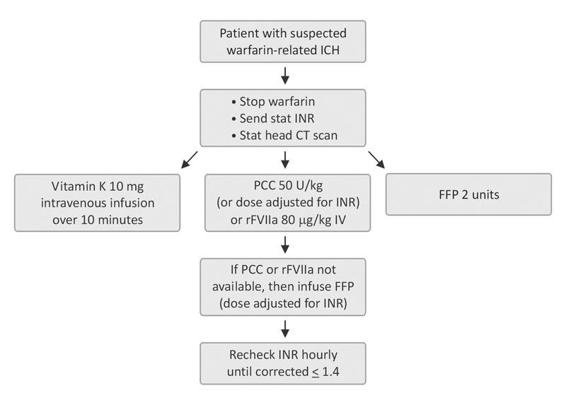Figure 69.1. Enlargement of hematoma due to warfarin anticoagulation. 64 year old woman with hypertension and atrial fibrillation, receiving long-term warfarin oral anticoagulation for cardioembolic stroke prevention. Initial INR 4.5. Panel A demonstrates the non-contrast head CT scan at initial presentation, which likely represents a hypertensive ICH occurring while the patient was being treated with warfarin. At this time she was alert, with normal language, and a mild right hemiparesis. Fresh frozen plasma was ordered, cross-matched, thawed and intravenous administration begun. 10 hours later the patient deteriorated due to massive hematoma expansion (Panel B) and later died.

Figure 69.2. Proposed algorithm for hyperacute warfarin reversal.
69.6 Conclusions
Anticoagulant-associated intracranial hemorrhage is increasing in incidence. Because it is associated with high risk of ongoing bleeding, death, or disability, urgent reversal of coagulopathy is of the highest priority. Several agents are available, all with various positive and negative attributes. All protocols for warfarin-related intracranial hemorrhage emphasize immediate cessation of the anticoagulant medication and immediate administration of vitamin K (usually intravenously). The use of PCC or rFVIIa may reverse coagulopathy more rapidly than FFP alone, but randomized trials testing this have yet to be performed. Furthermore, cost and availability of these agents may limit their widespread use.
References
1. Flaherty ml, Kissela B, Woo D, et al. The increasing incidence of anticoagulant-associated intracerebral hemorrhage. Neurology 2007; 68: 116-21
2. Flibotte JJ, Hagan N, O’Donnell J, et al. Warfarin, hematoma expansion, and outcome of intracerebral hemorrhage. Neurology 2004; 63: 1059-64
3. Schulman S, Bijsterveld NR. Anticoagulants and their reversal. Transfus Med Rev 2007; 21: 37-48
4. Steiner T, Rosand J, Diringer M. Intracerebral hemorrhage associated with oral anticoagulant therapy: current practices and unresolved questions. Stroke 2006; 37: 256-62
5. Goldstein JN, Rosand J, Schwamm LH. Warfarin reversal in anticoagulant-associated intracerebral hemorrhage. Neurocrit Care 2008; 9: 277-83
6. Mayer SA, Brun NC, Begtrup K, et al. Efficacy and safety of recombinant activated factor VII for acute intracerebral hemorrhage. N Engl J Med 2008; 358: 2127-37
7. Goldstein JN, Thomas SH, Frontiero V, et al. Timing of fresh frozen plasma administration and rapid correction of coagulopathy in warfarin-related intracerebral hemorrhage. Stroke 2006; 37: 151-5
8. Huttner HB, Schellinger PD, Hartmann M, et al. Hematoma growth and outcome in treated neurocritical care patients with intracerebral hemorrhage related to oral anticoagulant therapy: comparison of acute treatment strategies using vitamin K, fresh frozen plasma, and prothrombin complex concentrates. Stroke 2006; 37: 1465-70
9. Sjoblom L, Hardemark HG, Lindgren A, et al. Management and prognostic features of intracerebral hemorrhage during anticoagulant therapy: a Swedish multicenter study. Stroke 2001; 32: 2567-74
10. Freeman WD, Brott TG, Barrett KM, et al. Recombinant factor VIIa for rapid reversal of warfarin anticoagulation in acute intracranial hemorrhage. Mayo Clin Proc 2004; 79: 1495-500
11. Broderick J, Connolly S, Feldmann E, et al. Guidelines for the management of spontaneous intracerebral hemorrhage in adults: 2007 update: a guideline from the American Heart Association/American Stroke Association Stroke Council, High Blood Pressure Research Council, and the Quality of Care and Outcomes in Research Interdisciplinary Working Group. Stroke 2007; 38: 2001-23
12. Ansell J, Hirsh J, Hylek E, et al. Pharmacology and management of the vitamin K antagonists: American College of Chest Physicians Evidence-Based Clinical Practice Guidelines (8th Edition). Chest 2008; 133: 160S-198S
13. Baker RI, Coughlin PB, Gallus AS, et al. Warfarin reversal: consensus guidelines, on behalf of the Australasian Society of Thrombosis and Hemostasis. Med J Aust 2004; 181: 492-7
14. Hanley JP. Warfarin reversal. J Clin Pathol 2004; 57: 1132-9
15. Schulman S. Clinical practice. Care of patients receiving long-term anticoagulant therapy. N Engl J Med 2003; 349: 675-83
Stay updated, free articles. Join our Telegram channel

Full access? Get Clinical Tree






